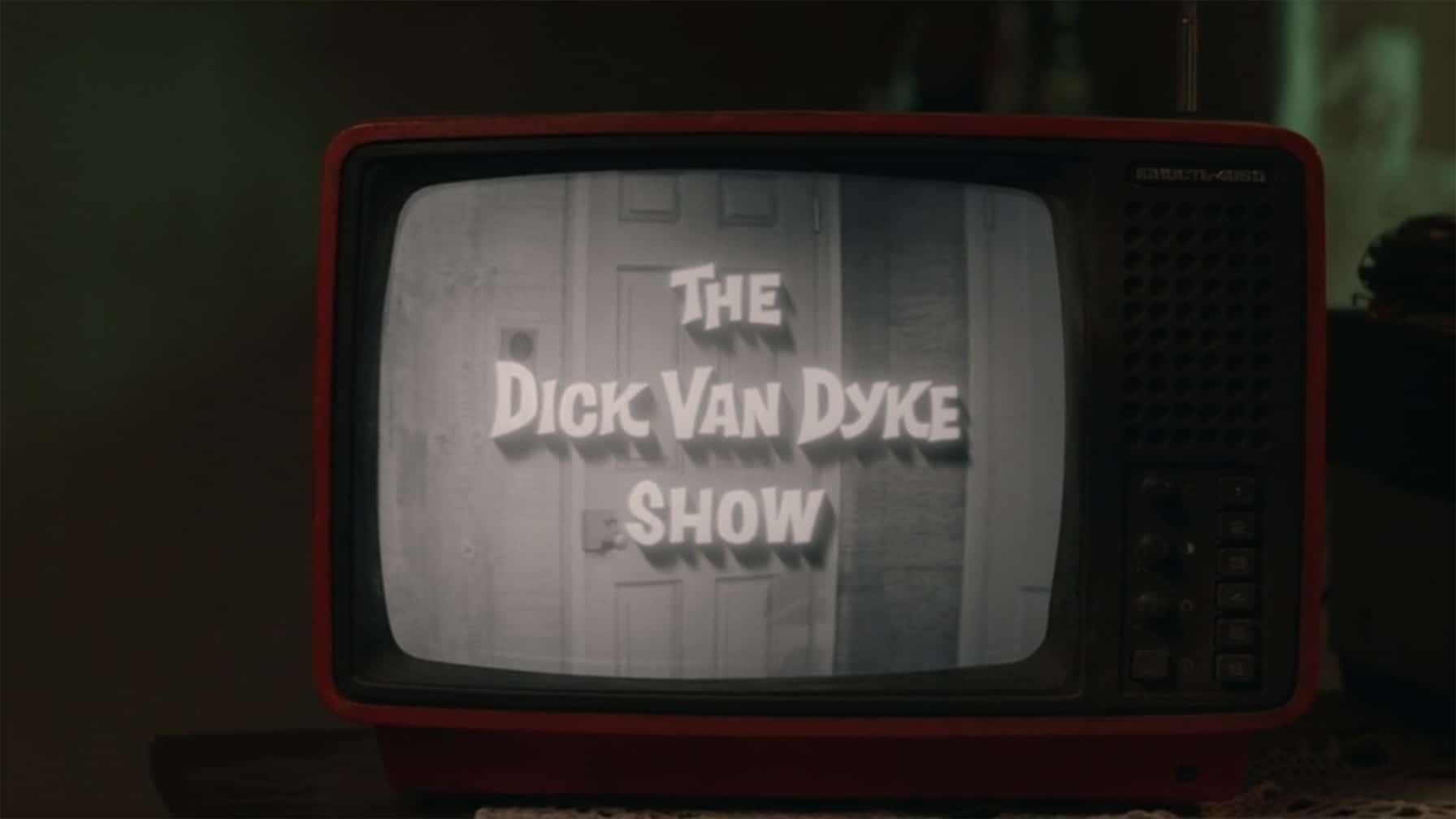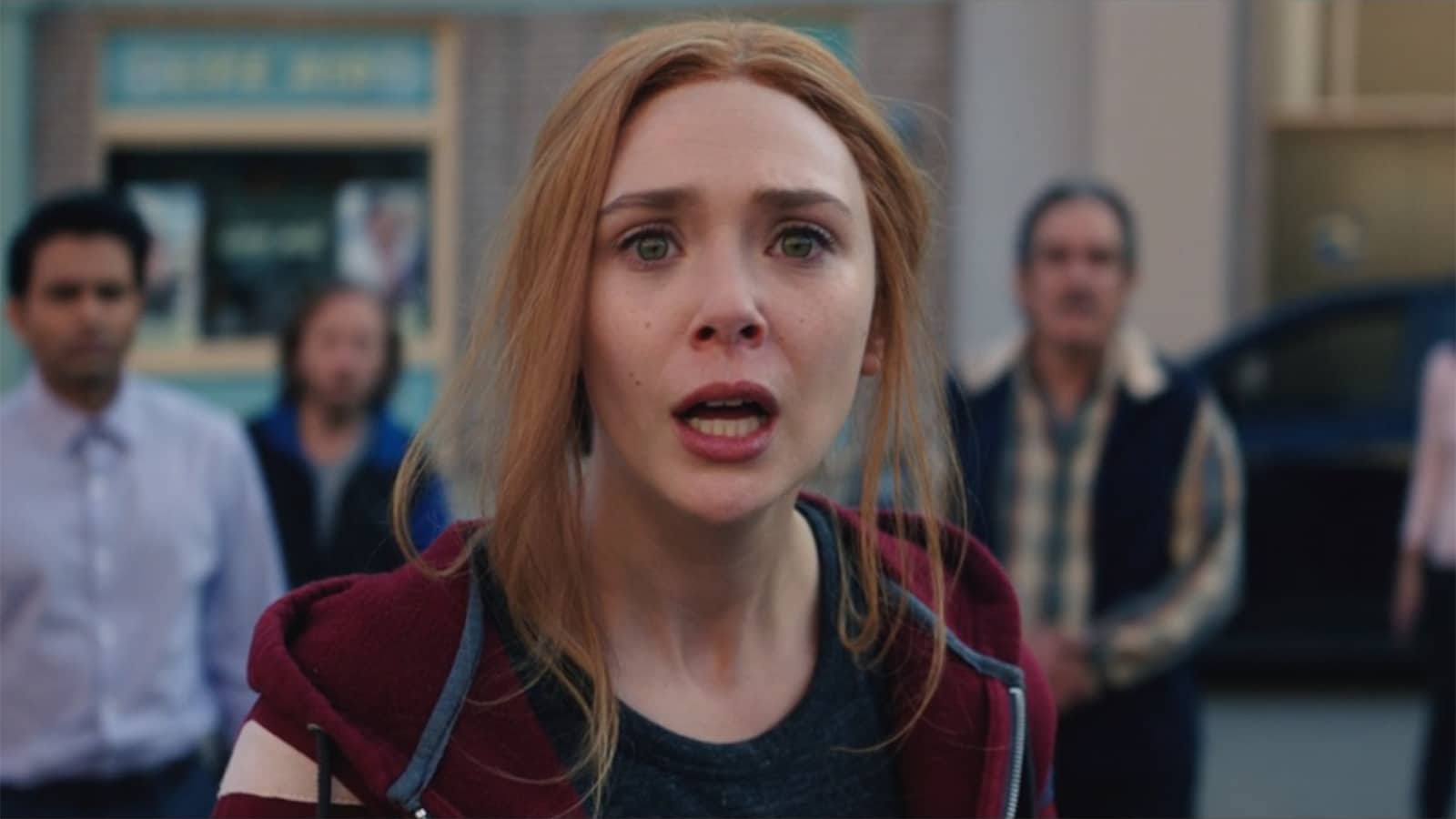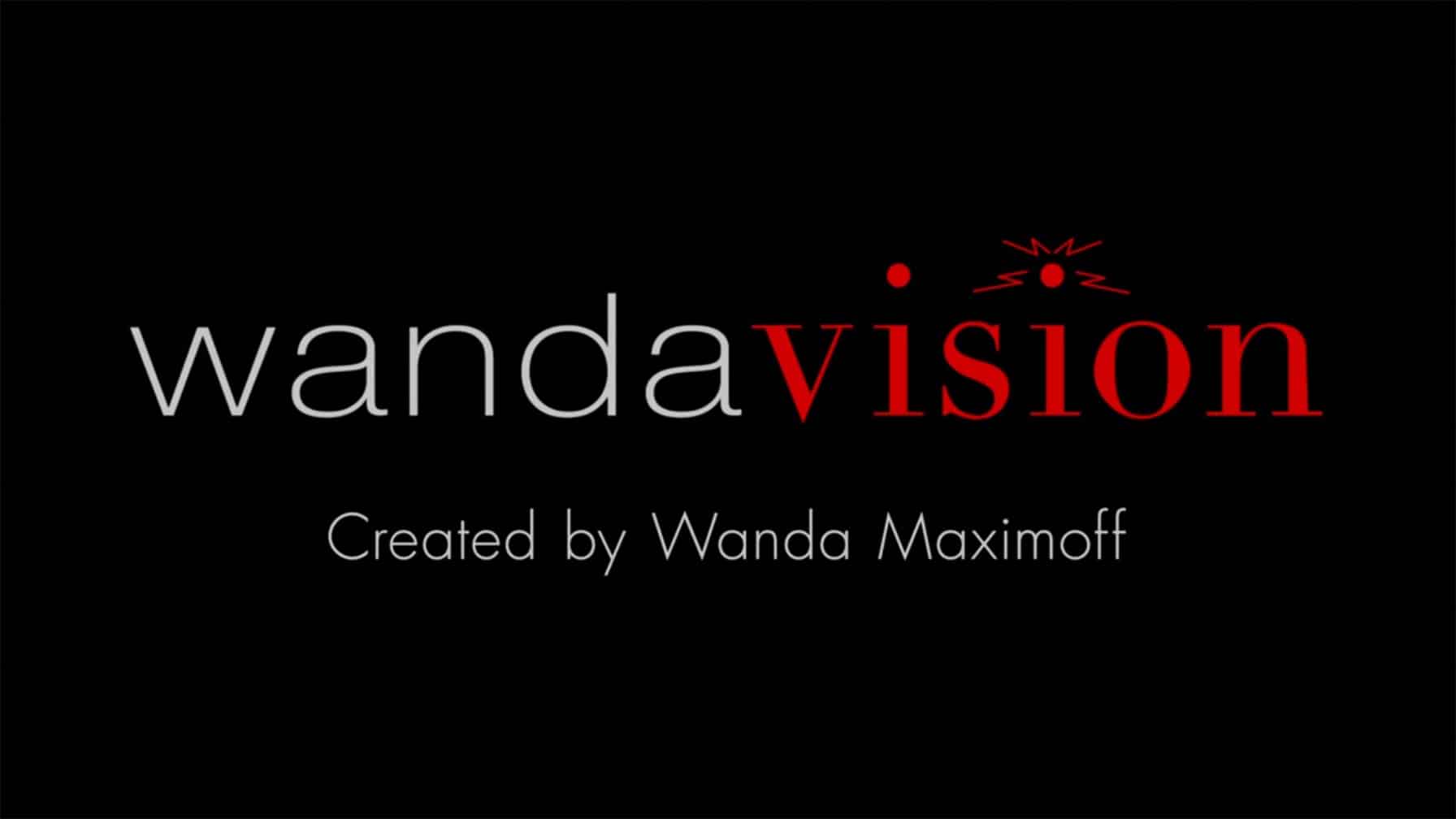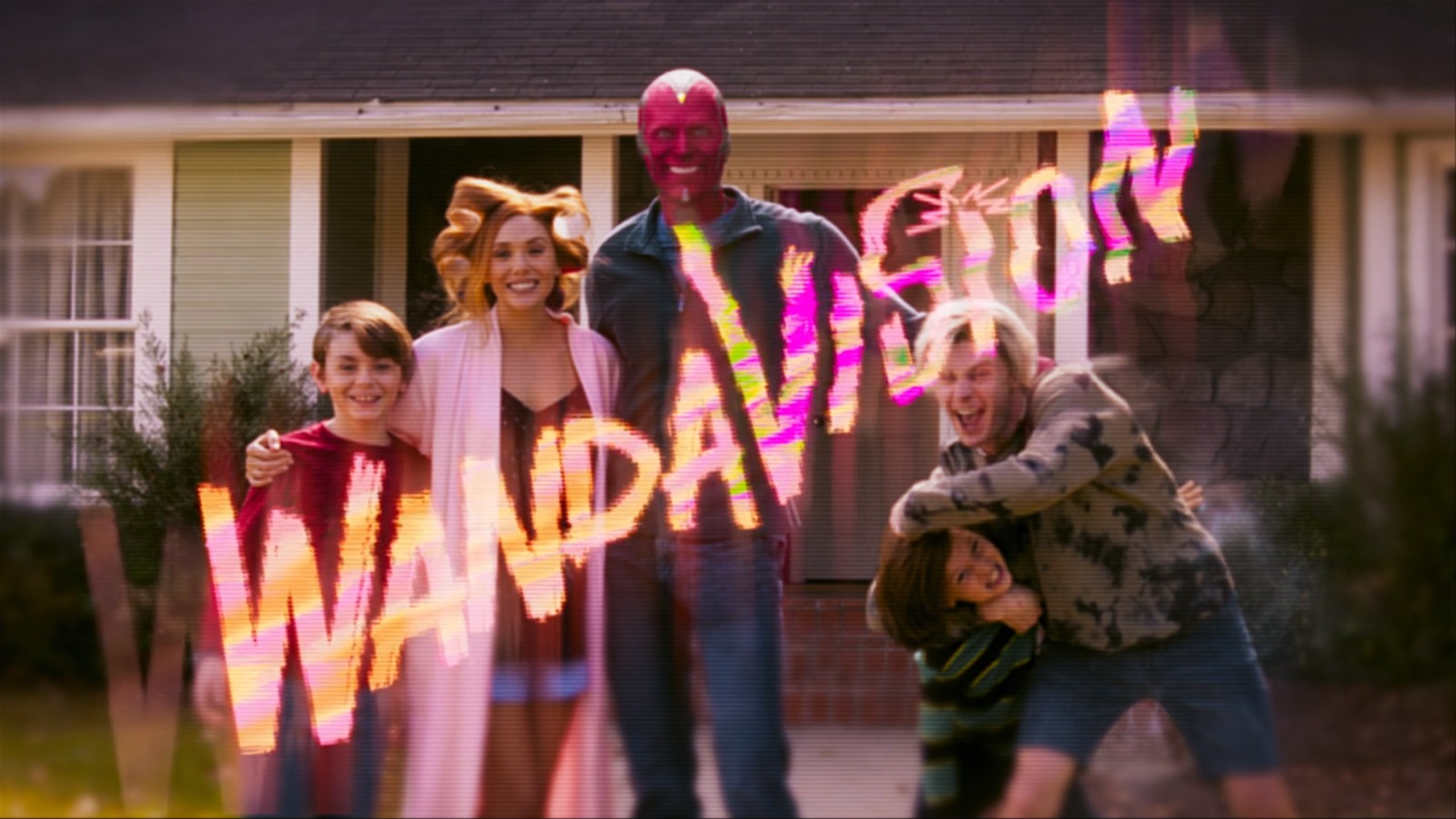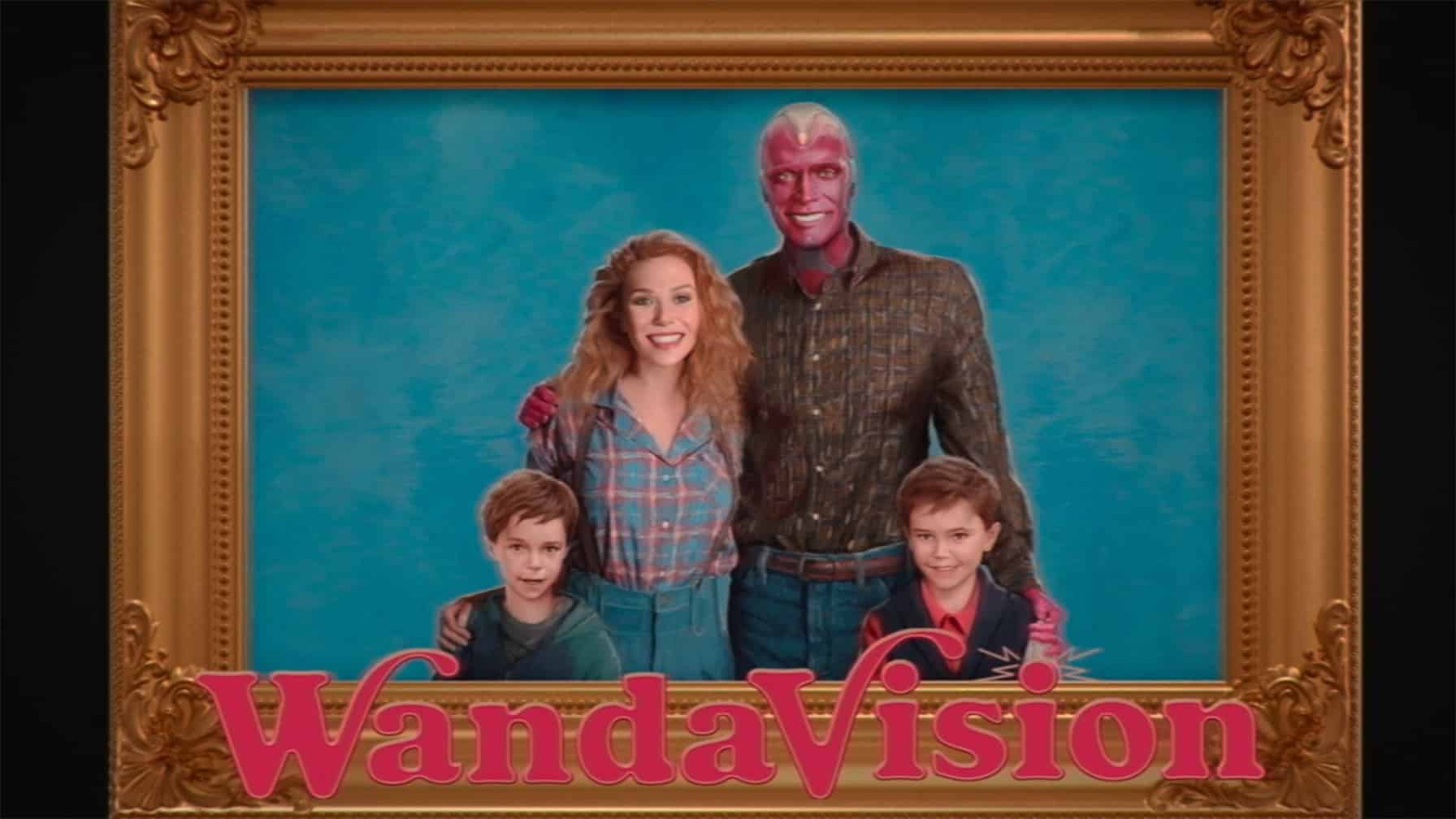[Content warnings for discussions of trauma presented in WandaVision episode 8, and the 90s-00s conflicts in Yugoslavia]
Mikey Zee: Another week, another WandaVision, where superhero powers definitely never cause problems! For our WandaVision episode 8 recap, this week’s contestant will compete to win… a discussion on this episode, AND an article credit on hit new site ComicsXF! Charlie, who’s up?
[a disembodied voice]: Thomas Cummins, come on down! You’re on WandaVision!
MZ: Thomas, I’m so excited to have you with us today to talk about this episode! Especially because I feel like your experience with reality shows like Total Divas is the perfect background to talk about Kathryn Hahn’s Agatha this week.
Thomas Cummins: Mikey, I’m so glad to be here with you this week! As far as my experience with Total Divas goes, I think the reference is spot on for this episode. This almost plays out like a sadistic version of a confessional from a reality show. While there’s no wrestling, Wanda does take a few bumps there in the beginning.
MZ: Tons of emotional bumps in this episode. So, without further ado, let’s step behind door number one!
Let’s Make a Deal

TC: ?It was Agatha All Along!? Sorry, that’s still stuck in my head after last week, but we do get a big Agatha moment right from the get-go. It’s a bit of a bait-and-switch, too. What we think might be a run-of-the-mill Salem-style witch burning, turns out to be her coven punishing her for breaking their rules and dabbling in dark magic. Though, Agatha turns the tables on them and it looks like she steals their powers.
MZ: Yeah, woof. What’s not clear to me here is… whether or not Agatha’s playing them hot and cold, or whether she truly knows the evil deeds she’s doing here. In the modern day we see a cruel yet vampy Agatha. But back in the past, even as she takes her mother’s broach, she looks slightly confused and almost… regretful?
TC: I definitely caught a few moments of unsureness from her throughout the episode. When she’s pleading with her coven and while she’s confronting Wanda in the basement, she has this genuine hunger for magical knowledge rather than some premeditated malintent. She’s intent on discovering the secrets of the magic Wanda’s been using to transform Westview, and she’s going to comb through Wanda’s past to do it. Which brings us to Sokovia.
MZ: I figured we’d get something showing Wanda’s past after seeing the cast and crew talk so much about how the use of sitcoms reflected Wanda’s childhood. What I wasn’t expecting is how Episode 8 connected the sitcoms directly to Wanda’s pain. However, I’d be remiss to talk about the emotional core of this scene without first talking about its context.
I think the MCU as a work of fiction is weakest at the intersection between the US war machine, Tony Stark, and its vague abstractions of the Middle East and Eastern Europe regions. At the very least, the MCU files the edges off the conflicts to make them PG-rated, even here. The issues that come from filing those edges off is a whole other conversation I’m not equipped to unpack fully. WandaVision could have tried to punch out of its weight class by adding depth to the Sokovian conflict. Instead, the show recontextualizes this event we know from a throwaway line, to show how Wanda became who she is. At least for me, that recontextualization is what makes this sequence still work despite my issues with the MCU’s worldbuilding.
I briefly mentioned in this series’ first piece that the MCU whitewashed Wanda Maximoff by re-writing her heritage and casting Elizabeth Olsen. Wanda’s comics history is… complicated to say the least. What’s stayed comics is that Wanda is a Jewish Romani woman, born in a fictional East European country. Despite WandaVision’s erasure of Wanda’s Romani heritage, she is still Eastern European here—albeit from the fictional country of Sokovia. We already knew from previous iterations of the MCU that Wanda grew up in this war-torn country as people fought for independence, the exact details of which have never been explained. It doesn’t take a degree in 20th century history to draw parallels between how Sokovia is presented, and the horrible real-life atrocities in Yugoslavia, especially when it comes to the role of United States imperialism in contributing to and perpetuating violence in the region.
So, the Wanda we see bears the trauma of being a refugee from an awful conflict. We see this directly when the Stark war machine takes her parents from her, at the very same time as exported American language and media give her joy. The juxtaposition of these elements and their impact feel complex, considered, and honest to the version of the character we see here. I think the writing team on WandaVision, led by Jac Schaeffer, did a lot of work to bring Wanda back in line with the history of her comics version, while fitting within the pre-existing MCU box, with Olsen on contract to play her.
TC: I think that’s why this TV show format has worked so well for WandaVision so far. They now have the actual time to dedicate to one or two specific characters that never got more than 10 minutes in an Avengers film. Episode 8 in particular has been able to develop the MCU version of Wanda more so than most of her previous movie appearances combined. I think as MCU continuity becomes just as messy as comics continuity (we’re 13 year in at this point), it’s going to be necessary for these writers to work within that framework to bring forward or pull back elements of characters’ comic book history.
MZ: That’s a really good point. While I personally don’t think it makes Age of Ultron a good film in retrospect, I think taking the parts of it that are worth using and reframing them is the path forward. And I think that the way they contrast the joy of Wanda spending time with her family watching the Dick Van Dyke Show with the sudden horror of what happens to them is an effective way of conveying how painful that was for her.
TC: Beyond losing her parents, some of Wanda’s darkest days are still ahead of her, memories she deeply does not want to revisit.
MZ: For sure. Really quickly before we move on though… I do want to say. I’m so glad Episode 8 officially said Wanda has innate magic. I don’t think we’ve moving full on to an integrated Fox X-Men universe (since that version of Pietro is now officially Fietro), but I do think this brings us one step closer to righting the wrongs Ultron does by Wanda’s character.
TC: Exactly! Wanda isn’t even a mutant in the comic book canon anymore, and I’m glad that this show is giving us a fully magic-infused version of her. There’s a few moments in this episode that hint at James Robinson’s Scarlet Witch solo run being a touchstone for the writers, and I think that aspect is absolutely one of them. That won’t be the last we’ll see of elements of that run in this episode.
Survivor

TC: Agatha takes Wanda back to her days with HYDRA where she would be experimented on with, what we find out to later be, the Mind Stone. As she’s exposed to the encased Infinity Stone, it reveals its true form when she approaches it, and then explodes in a burst of light and energy. Within that light is a silhouette of a traditional comic book depiction of Wanda. Mikey, you mentioned this episode moving this Wanda closer to her comic book counterpart, and well, we’ve got a classic Scarlet Witch headpiece appearance here.
MZ: I was so, so excited to see this in Episode 8, not only because I love Wanda and her kids dearly, but also because it just feels so… right. Like things are shifting into alignment. For too long in both comics and the MCU, Wanda has been more defined by her trauma than the fact that she is an incredibly-powerful witch! She is able to do these incredible things, but instead everything focuses on what she can’t do. In the comics, this has usually meant she can’t be mentally or emotionally stable. Which is beyond messed up! So getting a hint here that she was, that she is meant for something more, meant the world to me.
Not only does the Mind Stone augment someone’s mind, but it can be a lens through which they view their true selves. I think that’s what happened here; more than altering or refining her powers, it showed Wanda who she really was inside, even if she couldn’t understand or accept it in the place she was at.
TC: I think the idea that the Mind Stone showed Wanda her true self immediately being followed up with this absolutely delightful memory with her and Vision watching Malcolm in the Middle is perfect. She’s just gone through the trauma of losing yet another family member, and she’s found comfort in the one person who she thinks she can’t lose. This metaphorical wave that keeps coming for her won’t let up, as she explains to Vision in her memory, but now that wave has come for Vision and she’s built up this shield so powerful that she’s not even sure herself how it came to be.
MZ: That line…
“What is grief, if not love persevering?”
Vision
MZ: That hit me, and I’m sure a lot of other folks, in a spot. That, followed by Vision immediately laughing at a funny spot in Malcolm… that’s the Vision I’d wanted to see and hadn’t until this series. I will be the first to admit, I’m a sucker for the trope of “robot who learns to be human.” Until WandaVision, Vision hadn’t really even felt like a character, more like a couple tropes just shoved into a box and shaken until slightly frothy. This completely honest and almost innocent pathos, in the face of everything they’d been through up until this point… this was the Vision I needed to see, and so perfectly recontextualizes everything about Wanda and Vision’s relationship.
Especially when I think back to how the rest of the heroes were treating her at this point, and the paternalistic version of Vision we saw in Civil War, it’s reassuring to know that was maybe the worst side of Vision, and this was the best.
It’s also interesting here to see how Agatha reacts to Wanda’s pain, and her memories. We haven’t brought it up yet, but I absolutely love how… delightfully vampy villain Hahn plays Agatha here. She’s so catty and fun, it almost makes you forget she’s practically torturing Wanda by making her relive her trauma like the world’s worst crisis therapist.
TC: Kathryn Hahn might be a master of the subtle comedic facial expression. She conveyed so much cattiness in just a few simple reactions in the back of a few scenes and in transitions between memories.
MZ: Thomas, you also mentioned Wanda’s memory, which I think is a point we’ll come back to, but there’s another manipulation of facts and events that I think is worth talking about: Hayward’s. So… onto our final door.
The Misery Index

MZ: So, Thomas. I’m curious what you thought of Hayward up until this point.
TC: Hmm, I don’t think I ever gave him any real importance in my mind. If anything he’s just the mid-level boss that’s there to pad out the length of a video game. Yes, he has this “real world” power over people like Monica, Darcy, and Jimmy because they don’t (or didn’t in Monica’s case) have any superpowers. They have to just deal with or find a way through all this red tape he keeps throwing around.
Hayward and SWORD might be powerful, but to Wanda they just seem like a gnat. Wanda’s next memory is at the SWORD facility, and all Hayward does is just be this tiny, annoying thing flying around in front of her face. He’s putting up literal walls between her and her grieving process. She wants to bury the love of her life, and he continually belittles his existence. I wanted Wanda to bring that whole facility down on his head, but instead she just leaves.
MZ: See, it’s interesting you say that, because I definitely think Hayward is there to serve a plot purpose more than be a capital-C Character… but I also think what came through for me in this scene is that he is deliberately manipulating Wanda.
I think he and his team at SWORD had failed at actually bringing Vision back online, and they were hoping Wanda would come by and fix their “problem” for them. The leading comment he makes about having the power to bring Vision back “online”… when all she wanted was just to say goodbye, to give her lover a funeral, is telling. He doesn’t have the power to bend reality, but he tries nonetheless. But Wanda’s not the villain he so clearly wants her to be.
TC: She walks out the front door, walks across the parking lot, and gets in her scarlet-colored Buick sedan. But, there is something waiting for her on the passenger seat: a plan for a house from Vision. This finally brings us back to Westview.
MZ: It’s so interesting to see a Westview outside of Wanda’s world. In the wake of The Blip and everyone being returned… it’s still a ghost town, a husk of small-town Americana that so many people have clearly left. The few who remain are sad and lonely, sparing a passing glance at Wanda’s car as she drives by, but her final destination is a plot of land filled with a layer of cinderblocks and rebar. A house that was started, but never finished.
TC: We’ve already seen all the homes Wanda has ever known, and so she fills that empty lot with the homes she grew up with, but never lived in—the ones from the sitcoms that helped her through the toughest times in her life. An idyllic world that she can finally control. That burst of magical energy materializes a whole house, but also transforms all of Westview. This was a way of helping herself, but maybe also to help all of the forlorn residents of this sparsely populated small town.
With this last memory unlocked, Agatha finally understands. Wanda has been using what she calls “chaos magic” and gives her the moniker of the Scarlet Witch. This is yet another parallel to James Robinson’s 2016 Scarlet Witch solo book. There we learn that being the Scarlet Witch is Wanda’s birthright, passed down to each generation of witch in her family. I’m not sure if that’s what we’ll learn in the next episode, but they’re absolutely treading familiar territory here.

MZ: Yes, I do like the parallels there to the “House of M” event. In that story, she tried to make the world a better place, but failed to realize that by doing so, she was robbing people of their agency. Speaking from experience as someone with PTSD: without working through it, sometimes it becomes hard to see that your method of coping and healing doesn’t necessarily work for others. Without active work and healing, trauma and abuse can become a cycle. Charles Pulliam-Moore over at io9 wrote about this same episode and how Agatha herself is perpetuating this cycle, which is a really apt read. I think it helps explain some of why Agatha worked so hard to push Wanda past the literal PTSD mental block she had that kept her from remembering the why and how of this all starting.
Speaking of trauma and pain… this brings us to the post credits: Hayward bringing Gray Vision online.
TC: I’m not sure what to make of Gray Vision. That era of Avengers is a huge blind spot for me.
MZ: Same for me. Thankfully, we do have a Gray Vision expert on the CXF team. Time to phone a friend: Vishal, I know Gray Vision has some special significance to Wanda’s story, so maybe you can help us out.
Vishal Gullapalli: So! In the late 80s, Vision got really messed up and traumatized and took control of the Avengers and started hacking world governments’ computer systems to take complete control of the planet. This was, obviously, bad. So a few years later, at the start of John Byrne’s (bad) Avengers run, a rogue group of the US Government stole his body and completely deconstructed Vision, much like we see in WandaVision. The Avengers (including Scarlet Witch) find him and put him back together, but he is both completely colorless as well as emotionless.
See, the original Vision’s brainwaves were patterned after Simon Williams’, AKA Wonder Man. More than that – Ultron, Vision’s creator, scanned Simon’s brainwaves himself and implanted them into Vision, which is what gave Vision his emotional core and the ability to rebel against his creator. But when Vision was reconstructed, he no longer had Simon’s brain patterns – he remembered his history with Scarlet Witch, but was unable to evoke any emotions or feelings about their relationship.
Even worse than that, Simon Williams turned completely heel—he refused to allow the Avengers to use his brain patterns to bring the Vision back, eventually revealing that it was because he was in love with Wanda and didn’t want to bring her husband back to life. And because John Byrne is John Byrne, Wanda and Simon eventually got together and it was terrible. Vision would eventually get back both his color and his brain patterns by himself, essentially “recovering lost data.” But the aftermath of his turning into White Vision remained – he and Wanda never got back together, and Wanda herself would be written as more and more “hysterical” until the events of “House of M.”
MZ: Thanks so much, Vishal. That added some really helpful context, and I’m interested to see how they pull in elements of that history next episode… minus the hysterical part. I even think we might get the Young Avengers Vision I made reference to in an earlier recap, if we do end up with two versions of Vision floating around…
TC: I’m excited to see where this final episode brings us! This show has been one hell of a ride, so I’m expecting nothing less than a stellar finale.
MZ: Mmm… WandaVision episode 8 was a complicated episode for me. On the one hand, this is the first episode that made me tear up not once, but multiple times. I screamed in delight when it became clear that not only was Wanda innately magical, but it was probability-based Chaos Magic. Episode 8 gave Wanda an emotional anchor, summing up Wanda’s grief and trauma in a way that the previous episodes and MCU movies were lacking. However, when I sit back and think about it critically, I struggle with how I feel about Wanda’s history, the way the MCU treats foreign countries, and the legwork this episode had to do to bring things back to a point where MCU Wanda isn’t so far away from the Wanda in comics.
I’ve seen a lot of friends say they thought this was the weakest episode thus far, as it felt like a lot of exposition that could have been broken up better. But for me, it was necessary to at least try to ground this version of Wanda as much as they could in the MCU box. I just hope my faith in the creative team thus far isn’t misplaced, and that they stick the landing.
Thank you so much for going on this journey with me, Thomas! And readers: until next time!

